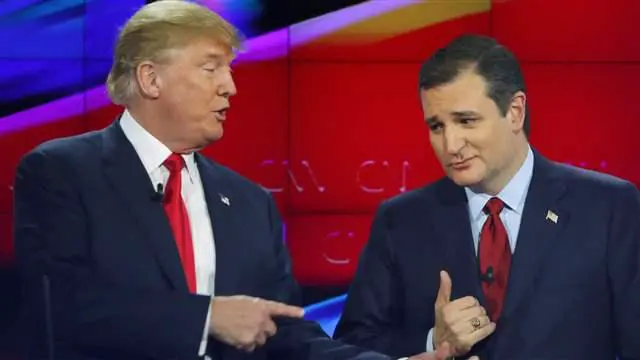Ted Cruz's win in the Wisconsin Republican Party (GOP) primaries has increased the challenger's momentum moving forward, but experts say the hard-right senator's message may not play well in the next round of primaries in more left-leaning states.
The Texas lawmaker beat GOP front-runner Donald Trump 48 percent to 35 percent on Tuesday night, in what he called "a turning point" in the GOP race for the presidential nomination.
The in-your-face Trump has dominated the news cycle in recent months on his anti-Washington message, and has riled up Republican rank-and-file voters who are fed up with a system and an economy they feel has left them in the dust. But while the controversial Trump has endeared himself to supporters, many others are turned off by a candidate they feel is anti-women, anti-immigrant and downright obnoxious -- and that was especially the case in Wisconsin on Tuesday.
"Cruz's victory means he now has momentum over Trump," Brookings Institution's senior fellow Darrell West told Xinhua
"The GOP billionaire suffered a backlash from his negative comments about women and rash comments about NATO, abortion, and nuclear weapons," he said, referring to recent Trump remarks that suggested women who have abortions be punished should the procedure ever be banned in the United States.
Trump has also suggested that U.S. forces pull out of Japan and South Korea and says those countries be allowed to develop nuclear weapons -- statements that have alarmed many critics.
"(Trump's) bombastic rhetoric finally caught up with him and generated significant political damage," West said.
Indeed, also of no help to Trump was the fact that Wisconsin is a hub of traditional Mid-Western values such as civility and good manners, where voters are not likely to take a shine to candidates such as Trump.
"The persona and temperament of Trump was never one that would work well with the Wisconsin electorate -- call it a clash of Midwestern culture and New York braggadocio," Dan Mahaffee, an analyst with the Center for the Study of the Presidency and Congress, told Xinhua.
Moreover, Wisconsin boasts an active Tea Party organization -- Cruz was elected to the senate in 2012 as a Tea Party candidate -- and the Republicans who vote there are sympathetic to Cruz. The state's Republicans also have voted hard-right in recent elections.
"All the turmoil surrounding the Trump campaign has given Cruz an opportunity to broaden his base. So far, he has been limited to ultra-conservative and evangelical voters, but other people are taking a serious look at him," West said.
The challenge now for Cruz is whether he can maintain his momentum and broaden his appeal enough for those outside his core group of supporters -- evangelicals and hard-right conservatives -- to actually vote for him.
In that respect, Cruz is faced with a tough challenge in states such as New York -- a bastion of liberal voters -- and Pennsylvania, which are coming up later this month. Trump is also highly unlikely to lose his home state of New York, where he has been a household name for decades.
West said that Cruz's biggest challenge at this point is the campaign shifting to places like New York and Pennsylvania "that don' t seem very hospitable to the Texan's hard-right message."
There is also a problem of simple mathematics. The winning candidate must secure 1,237 delegates, and Trump is the clear frontrunner in that regard after having won several states in recent months.
"It still will be very hard for Cruz to actually win enough delegates, particularly with the race turning to the northeast where Cruz will look very right, but it does put him in much better position to ensure a brokered or contested convention," Julian Zelizer, professor of history and public affairs at Princeton University, told Xinhua.
Mahaffee said that Trump continues to draw strong support from angry grassroots supporters, adding that moderate Republicans still have a hard time coming around to Cruz.
For those reasons, the upcoming primary contests in the northeast United States won't be as favorable to Cruz.
While Trump is only polling in the mid-30s in states like Pennsylvania and Maryland, Cruz and Ohio Governor John Kasich divide the rest of the GOP vote, giving Trump a strong plurality, Mahaffee said. Enditem
 简体中文
简体中文

